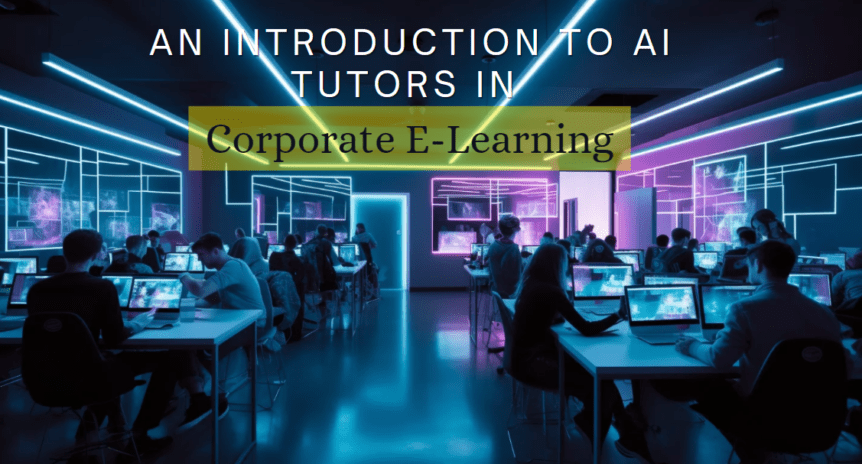An Introduction to AI Tutors in Corporate E-Learning
AI (artificial intelligence) is arguably the hottest topic in tech right now. Whole industries are exploring how to utilise the latest AI technologies, many of which have taken a considerable step forward since ChatGPT exploded into the public consciousness in early 2023. What about AI technologies in e-learning? At Capytech, we are focusing on one specific usage application that we believe adds considerable value – AI tutors in e-learning.
It is important to narrow the focus when considering AI technologies as the potential scope is vast. For us, the application of any new technology has to be practical and rooted in the real world. In other words, it has to enhance the learner experience, improve training outcomes, and deliver a better return on investment. AI tutors in corporate e-learning tick all three of those boxes.
What Are AI Tutors in Corporate E-Learning?
We are going to explore the features, benefits, and usage applications for AI tutors in e-learning in our upcoming blogs. This blog is an introduction to give you an overview of how the technology works and its potential.
So, what are AI tutors in corporate e-learning? As we are talking about AI, we decided to ask one of the mainstream AI tools this exact question. Its response was as follows:
“In the realm of e-learning, an AI tutor is an artificial intelligence-based system designed to provide personalized and adaptive learning experiences to students.”
That’s not a bad starting point, but it’s worth delving further to get into some of the specifics.
Before doing that, the implications of the above point are worth highlighting, i.e., AI doesn’t have all the answers and it can’t do everything, just like it couldn’t fully answer our question about AI tutors in e-learning. AI tools can’t replace subject matter experts, designers, writers, and in-person tutors, but the latest technologies adapted in the right way can help, improve, and enhance all aspects of not only the e-learning course creation process but also the learner experience.
How Do AI Tutors Work in Corporate E-Learning?
Back to our AI-created starting point – an AI tutor provides personalised and adaptive learning experiences. It does this by answering learner questions using the information it has been trained on specifically for your organisation and/or e-learning course.
So, let’s say your e-learning course is on the topic of cybersecurity awareness. An AI tutor in this course won’t be able to give the learner a training schedule to complete a marathon or step-by-step instructions on how to take better photos using a phone. It will, however, be able to answer a question about your organisation’s cybersecurity policy or how to create a secure password as it will have been trained specifically on this information.
A key part of the technology is that it uses natural language processing, or NLP. In simple terms, this means the learner can ask the tutor questions using normal, everyday, conversational language. The AI tutor will understand what the learner is asking, and it will respond using similar, easy-to-understand language.
What Does This Mean for Your E-Learning Courses?
AI tutors can be integrated into both existing and new e-learning courses, enhancing the content in several different ways:
- Provides support that is tailored to the learner’s requirements. For example, instead of trying to anticipate questions that a learner might ask in an FAQ section, the AI tutor will answer the exact question that is asked.
- The support is available to the learner when it’s required. This is an enhancement to the current situation commonly used where learners interact with a human tutor to ask questions. Human tutors are not always available, so there can be delays in getting a response. Responses from an AI tutor are immediate.
- As mentioned above, the technology is restricted to your content and material, so the AI tutor is only trained on your material and can only provide answers based on the information you provide, e.g., a policy document, user manual, etc.
- The ability to ask an AI tutor a question further customises the learner experience.
- The technology also enhances the inclusivity of the course as learners who need additional help will have access to what they need when they need it. An AI tutor also has the potential to reduce the stigma of asking a question when a concept is not fully understood.
- The technology can reduce pressure on training resources as they will have fewer questions to answer. This is particularly beneficial if the e-learning course is distributed to a large number of learners at the same time.
- Following on from the above point, you can also reduce costs by using AI technologies to undertake the repetitive task of answering learner questions.
What Should You Do Next?
A lot of the talk about the applications of AI technologies are predictions, i.e., if the technology continues to develop, we anticipate being able to do X, Y, Z in the future. This is not the case with AI tutors in corporate e-learning, as the technology exists now.
We’ve been working on our own version at Capytech for a while now and it is super cool.
What you should do next is reach out so we can give you a personalised demo. We’re excited about the technology, and we think you will be too.
